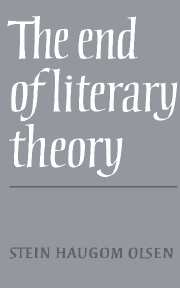Book contents
- Frontmatter
- Contents
- Preface
- Literary aesthetics and literary practice
- Interpretation and intention
- Authorial intention
- Text and meaning
- The ‘meaning’ of a literary work
- Defining a literary work
- What is poetics?
- On unilluminating criticism
- Criticism and appreciation
- Value-judgements in criticism
- Literature, fiction, and reality. A problematic relationship
- Thematic concepts: where philosophy meets literature
- Literary theory and literary aesthetics
- Notes
- Bibliography
- Index
On unilluminating criticism
Published online by Cambridge University Press: 05 November 2011
- Frontmatter
- Contents
- Preface
- Literary aesthetics and literary practice
- Interpretation and intention
- Authorial intention
- Text and meaning
- The ‘meaning’ of a literary work
- Defining a literary work
- What is poetics?
- On unilluminating criticism
- Criticism and appreciation
- Value-judgements in criticism
- Literature, fiction, and reality. A problematic relationship
- Thematic concepts: where philosophy meets literature
- Literary theory and literary aesthetics
- Notes
- Bibliography
- Index
Summary
ONE
A literary work presents its readers with a problem of understanding. Take Blake's brief lyric ‘London’ from his Songs of Experience:
I wander through each chartered street
Near where the chartered Thames does flow,
And mark in every face I meet
Marks of weakness, marks of woe.
In every cry of every man,
In every infant's cry of fear,
In every voice, in every ban,
The mind-forged manacles I hear –
How the chimney-sweeper's cry
Every blackening church appalls,
And the hapless soldier's sigh
Runs in blood down palace walls;
But most through midnight streets I hear
How the youthful harlot's curse
Blasts the new-born infant's tear
And blights with plagues the marriage hearse.
This poem presents a series of critical problems at the most basic level of understanding. What does the author mean by ‘chartered street’, and why does he talk about the Thames as ‘chartered’? What are ‘mind forged manacles’ and how can these manacles be heard in voices and bans? And what exactly are ‘bans’ meant to signify here? In the two last stanzas this verbal opacity increases. How can the chimney-sweeper's cry ‘appall’ the church and why does the author describe the church as ‘blackening’? And what can the author mean by saying that the ‘soldier's sigh / Runs in blood down palace walls’? There are many more questions of this simple type which could be asked in connection with this poem and if criticism is to perform its function it must at the very least be able to provide answers to such questions.
- Type
- Chapter
- Information
- The End of Literary Theory , pp. 104 - 120Publisher: Cambridge University PressPrint publication year: 1987



